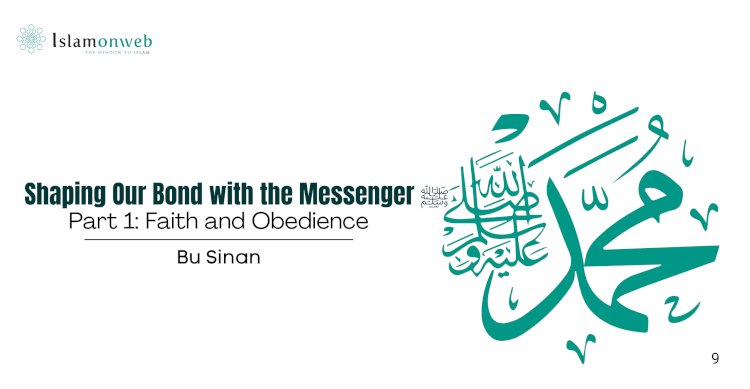Shaping Our Bond with the Messenger ﷺ – Part 1: Faith and Obedience
The essence of a believer’s bond with the Messenger of Allah ﷺ is built upon naṣīḥah, sincere devotion and loyalty.
Allah ﷻ says:
“There is no blame on those who cannot find anything to spend, provided they are sincere to Allah and His Messenger. There is no cause [for complaint] against those who do good. And Allah is All-Forgiving, Most Merciful.” (al-Tawbah 9:91)
The exegetes explain that this sincerity means being genuine in word and deed, both in private and public, with hearts fully at peace in submission.
The Prophet ﷺ declared:
“The religion is naṣīḥah, the religion is naṣīḥah, the religion is naṣīḥah.” They asked: “To whom, O Messenger of Allah?” He replied: “To Allah, to His Messenger, to His Book, to the leaders of the Muslims, and to their common people.” (Muslim, Abū Dāwūd)
The scholars explained that naṣīḥah to the Messenger ﷺ includes affirming his Prophethood with full certainty, obeying his commands, avoiding what he forbade, and striving to support, defend, and protect his honour both during his lifetime and after his passing. In his time, the Companions manifested this by giving him their lives and wealth, defending him against every enemy, and never wavering in obedience. After his departure from this world, naṣīḥah to him means continuing to uphold his Sunnah, spreading his teachings, honouring his family and companions, and safeguarding his noble way from neglect or distortion.
Imām al-Ājurri said that true naṣīḥah to the Messenger ﷺ requires two dimensions: sincere devotion during his life and after his death. In his life, it was to support him, defend him, and give absolute loyalty. After his passing, it is to remain committed to his honour, to teach and learn his Sunnah, to love him and his family, to warn against deviation from his way, to show mercy to his Ummah and follow his noble character in life.
This devotion is expressed through complete belief and submission, obedience and compliance, reverence and honour, and love and longing for him ﷺ.
Complete Belief and Submission
The foundation of our relationship with the Messenger of Allah ﷺ begins with īmān, absolute belief in him and unconditional submission to his words and commands. The Qur’an repeatedly calls the believers to this:
“Believe in Allah and His Messenger.” (al-Nisāʾ 4:136)
“So that you may believe in Allah and His Messenger.” (al-Fatḥ 48:9)
“So believe in Allah and His Messenger, the unlettered Prophet, who believes in Allah and His words, and follow him, that you may be guided.” (al-Aʿrāf 7:158)
“And whoever does not believe in Allah and His Messenger, We have prepared for the disbelievers a blazing Fire.” (al-Fatḥ 48:13)
Abū Bakr al-Ṣiddīq embodied this submission in its purest and highest form, and that's why he was named al-Ṣiddīq. He used to
When the Prophet ﷺ was met with rejection by Quraysh after the Isrāʾ and Miʿrāj, they mocked his claim. But Abū Bakr al-Ṣiddīq رضي الله عنه, without hesitation, said: “If he said it, then it is true.” These words reflect the unshakable principle of the Companions: whatever the Messenger ﷺ says is truth, for he is al-Ṣādiq al-Maṣdūq (the most truthful, the one believed), who does not speak from desire but only by revelation:
“Nor does he speak from [his own] desire. It is nothing but revelation sent down.” (al-Najm 53:3–4)
A powerful example is seen during the Treaty of Ḥudaybiyyah. ʿUmar ibn al-Khaṭṭāb رضي الله عنه struggled with the conditions of the treaty, questioning why the Muslims should accept what appeared to be humiliation when they were upon the truth. He said to the Prophet ﷺ: “Are you not truly the Messenger of Allah?” The Prophet ﷺ replied: “Yes, indeed.” ʿUmar continued: “Are we not upon the truth while they are upon falsehood?” He ﷺ said: “Yes.” Then ʿUmar asked: “Why then do we accept disgrace in our religion?”
The Prophet ﷺ responded:
“I am the servant of Allah and His Messenger. I will never disobey Him, and He will never forsake me. He is my Helper.”
Still unsettled, ʿUmar turned to Abū Bakr رضي الله عنه, who reminded him: “Indeed, he is the Messenger of Allah. He does not disobey his Lord, and Allah will aid him. Hold firmly to his rope until death, for by Allah, he is upon the truth.”
Only later did ʿUmar realise the depth of his error. He said, as reported in Ṣaḥīḥ narrations: “By Allah, I never doubted since I embraced Islam, except on that day.” Out of remorse, he spent years after Ḥudaybiyyah fasting, praying, giving in charity, and freeing slaves, hoping these deeds would erase the hesitation he once showed before the Prophet ﷺ.
He would later advise: “Accuse your opinions in matters of religion, for I once opposed the command of the Messenger of Allah ﷺ with my own reasoning. The Messenger of Allah ﷺ was content with me, but still I was not able to forgive me, until the Prophet ﷺ said: ‘O ʿUmar, do you see me content while you are still refusing?’”
This story reveals the essence of complete belief and submission: not weighing the Prophet’s ﷺ command against one’s own reasoning, but surrendering wholeheartedly, trusting that every word of his is truth and guidance. The Companions’ moments of hesitation only highlight how they ultimately returned with deeper conviction, teaching us that our path to faith is through unconditional surrender to the Messenger ﷺ.
Complete Obedience to the Messenger ﷺ
If belief in the Messenger ﷺ is the foundation of our relationship with him, then obedience (ṭāʿah) is its natural fruit. The Qur’an makes this inseparable link between īmān and obedience in numerous verses:
“O you who believe, obey Allah and His Messenger, and do not turn away from him.” (al-Anfāl 8:20)
“Say: Obey Allah and the Messenger.” (Āl ʿImrān 3:32)
“Obey Allah and the Messenger, so that you may be shown mercy.” (Āl ʿImrān 3:132)
“If you obey him, you will be guided.” (al-Nūr 24:54)
“Whoever obeys the Messenger has truly obeyed Allah.” (al-Nisāʾ 4:80)
“Whatever the Messenger gives you, take it. And whatever he forbids you, refrain from it.” (al-Ḥashr 59:7)
“Whoever obeys Allah and the Messenger will be with those Allah has blessed; the Prophets, the truthful, the martyrs, and the righteous.” (al-Nisāʾ 4:69)
The Qur’an is clear: obedience to the Messenger ﷺ is obedience to Allah Himself. His commands are life-giving, as Allah says:
“O you who believe, respond to Allah and His Messenger when he calls you to that which gives you life.” (al-Anfāl 8:24)
The commentators explain that this “life” refers to the life of the heart, achieved through faith, guidance, and submission. Thus, every command of the Prophet ﷺ revives our souls, and every prohibition saves us from ruin.
The Sīrah offers countless examples of the Companions’ readiness to obey the Prophet ﷺ without delay or hesitation and in letter and spirit:
- Not Asking Anything from People:
The Prophet ﷺ once took a pledge from some his Companions that they would worship Allah alone, establish prayer, and obey him. He also whispered a condition: “Do not ask people for anything.” (Muslim)
ʿAwf ibn Mālik said: “I saw some of those men later, if one of them dropped his whip, he would not ask anyone to hand it to him.” This shows the depth of their obedience to the Prophet ﷺ - Teaching a Child:
ʿUmar ibn Abī Salamah رضي الله عنه recalled: “I was a boy in the care of the Prophet ﷺ, and my hand would wander in the dish. The Prophet ﷺ said to me: ‘O boy, say Bismillah, eat with your right hand, and eat from what is in front of you.’ From then on, that became my habit.” (Bukhārī)
One simple instruction became a lifelong practice. Such was the impact of his words upon willing hearts. - Stopping a Wrong Action Instantly:
Abū Masʿūd al-Badrī رضي الله عنه once struck his servant. He suddenly heard a voice: “Know, Abā Masʿūd!” He turned to find the Prophet ﷺ repeating: “Know, Abā Masʿūd, that Allah has more power over you than you have over this boy.” Abū Masʿūd immediately dropped his whip and vowed never to strike a servant again. (Muslim) - Even in Sitting and Moving:
One Friday, the Prophet ﷺ sat upon the pulpit and commanded: “Sit down.” Ibn Masʿūd رضي الله عنه, who was still at the door of the mosque, sat where he was. The Prophet ﷺ saw him and said: “Come closer, O ʿAbdullāh ibn Masʿūd.” (Abū Dāwūd). His immediate sitting, even before entering, reflected the Companions’ haste in obeying every word. - Do Not Look Back:
At Khaybar, the Prophet ﷺ gave the banner to ʿAlī ibn Abī Ṭālib رضي الله عنه, instructing: “Go forward and do not turn back until Allah grants you victory.” ʿAlī walked on, then paused, remembering the command, and without turning, called out to ask for clarification. (Muslim) His carefulness shows how the Companions clung to the Prophet’s ﷺ words in both letter and spirit. - Abandoning Gold:
A man once wore a gold ring. The Prophet ﷺ removed it from his hand and cast it aside, saying: “Would one of you take a coal from the Fire and hold it in his hand?” After the Prophet ﷺ left, people said to the man, “Take your ring, at least sell it.” But he replied: “By Allah, I will never take it again after the Messenger of Allah ﷺ threw it away.” (Muslim)
These stories illustrate the depth of obedience the Companions lived with, whether in matters large or small, public or private. For them, the Prophet’s ﷺ words carried the authority of divine command.
The believer’s true courtesy (adab) with the Messenger ﷺ is complete submission to his guidance, without resistance or preference for one’s own reasoning. Allah says:
“It is not for a believing man or woman, when Allah and His Messenger have decided a matter, to have any choice about it.” (al-Aḥzāb 33:36)
ʿĀʾishah رضي الله عنها narrated that the Prophet ﷺ once sat on the minbar and instructed: “Sit down.” ʿAbdullāh ibn Rawāḥah رضي الله عنه, who was far away in Banī Ghanm, heard the command and immediately sat where he was. Such was their eagerness to obey, even without seeing him, even without knowing the reason. (Abū Nuʿaym, al-Bayhaqī)
This article is prepared primarily based on excerpts from Subul al-Hudā wa al-Rashād fī Sīrat Khayr al-ʿIbād, vol. 11, authored by Muḥammad ibn Yūsuf al-Ṣāliḥī al-Shāmī (d. 942 AH).
Disclaimer
The views expressed in this article are the author’s own and do not necessarily mirror Islamonweb’s editorial stance.
























Leave A Comment